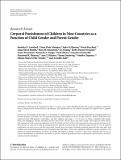| dc.contributor.author | Jennifer E Lansford, Liane Pena Alampay, Suha Al-Hassan, Dario Bacchini, Anna Silvia Bombi, Marc H Bornstein, Lei Chang, Kirby Deater-Deckard, Laura Di Giunta, Kenneth A Dodge, Paul Oburu, Concetta Pastorelli, Desmond K Runyan, Ann T Skinner, Emma Sorbring, Sombat Tapanya, Liliana Maria Uribe Tirado, Arnaldo Zelli | |
| dc.date.accessioned | 2020-08-07T08:24:07Z | |
| dc.date.available | 2020-08-07T08:24:07Z | |
| dc.date.issued | 2010-01-01 | |
| dc.identifier.citation | 155 | en_US |
| dc.identifier.uri | https://repository.maseno.ac.ke/handle/123456789/1884 | |
| dc.description | The article can also be accessed via URL;https://www.hindawi.com/journals/ijpedi/2010/672780/ | en_US |
| dc.description.abstract | The purpose of this paper is to contribute to a global perspective on corporal punishment by examining differences
between mothers’ and fathers’ use of corporal punishment with daughters and sons in nine countries. Methods. Interviews were
conducted with 1398 mothers, 1146 fathers, and 1417 children (age range = 7 to 10 years) in China, Colombia, Italy, Jordan,
Kenya, the Philippines, Sweden, Thailand, and the United States. Results. Across the entire sample, 54% of girls and 58% of boys
had experienced mild corporal punishment, and 13% of girls and 14% of boys had experienced severe corporal punishment by
their parents or someone in their household in the last month. Seventeen percent of parents believed that the use of corporal
punishment was necessary to rear the target child. Overall, boys were more frequently punished corporally than were girls, and
mothers used corporal punishment more frequently than did fathers. There were significant differences across countries, with
reports of corporal punishment use lowest in Sweden and highest in Kenya. Conclusion. This work establishes that the use of
corporal punishment is widespread, and efforts to prevent corporal punishment from escalating into physical abuse should be
commensurately widespread. | en_US |
| dc.description.sponsorship | This research was funded by the Eunice Kennedy Shriver
National Institute of Child Health and Human Development
Grant no. RO1-HD054805 and Fogarty International Center,
Grant no. RO3-TW008141. Kenneth A. Dodge is supported
by the Senior Scientist award 2K05 DA015226 from the
National Institute on Drug Abuse. This research was also
supported by the Intramural Research Program of the NIH,
NICHD. | en_US |
| dc.publisher | Hindawi Publishing Corporation | en_US |
| dc.subject | corporal punishment,mothers' , fathers', daughters, sons | en_US |
| dc.title | Corporal punishment of children in nine countries as a function of child gender and parent gender | en_US |
| dc.type | Article | en_US |

